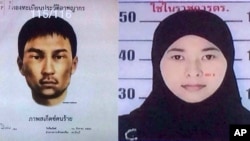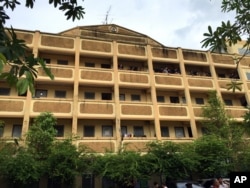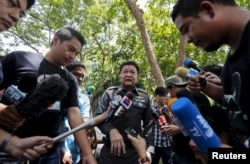Thai authorities investigating this month’s deadly Bangkok bomb attack on Monday announced finding more bomb-making materials in a raid on an apartment in the capital and arrest warrants for two new suspects – a 26-year-old Thai woman and a foreign man.
A photograph of the woman, identified as Wanna Suansan, in a hijab and a sketch of the unnamed male suspect were shown on a special broadcast on all Thai television channels at noon.
The disclosure came after police raided an apartment building Sunday, initially telling reporters nothing suspicious had been found.
But on the Monday broadcast, national police Lt. General Prawut Thavornsiri said fertilizer, explosives detonators and digital watches were seized during Sunday's search of multiple units in an apartment complex in the Min Buri district of Bangkok.
Police claim reward
Police on Monday also announced that a 3 million baht (about $83,000) reward offered to the public for information leading to the arrest of the bombing suspects would instead be paid to the police, after a 28-year-old foreign man was apprehended in a Saturday raid.
The suspect faces charges of possessing explosives.
“This was the work of the Thai officials, there were no tip-offs,” the national police chief, General Somyot Pumpanmuang, told reporters as he displayed bundles of the reward cash he said was from his personal funds and a donation from an anonymous businessman friend of his.
Officials said they found explosives, chemicals, ball bearings and other elements to make pipe bombs in a unit on the eastern outskirts of Bangkok where they apprehended the foreigner.
The components were said to be similar to those used in devices that detonated at the Erawan Shrine on August 17 and in the Chao Phraya River, adjacent to the Sathorn Pier, the following day.
The blast at the Hindu shrine, popular with Chinese and other Asian tourists, killed 20 people and wounded more than 100 others – the worst single mass casualty attack in Thailand.
The subsequent explosion at the pier caused no injuries.
Uighur deportation
It is unclear whether the shrine bombing has any connection to Thailand’s deportation in July of more than 100 ethnic Uighurs to China, army commander-in-chief General Udomdej Sitabutr said Monday.
Thai authorities have been hesitant to link the attack to international terrorism.
Instead, authorities have insisted since Saturday that it is likely connected to a human smuggling organized crime ring or a gang bent on revenge for crackdowns by police.
Analysts have given those explanations little credence and human rights groups have expressed concern about how the lack of legitimate political, security and judicial authority in a country under military government could undermine public trust in the investigation’s outcome.
The head of the Thai military junta, Prime Minister Prayuth Chan-ocha, has cautioned against concluding that the shrine bombing was linked to international terrorism or mentioning any possible connection to Turkey.
In recent days speculation had increased about the bombing’s possible link to China's ethnic Uighur minority or their co-religious sympathizers in Turkey.
Thailand's deportation of the Uighurs led to an attack on the Thai consulate in Istanbul where windows were smashed.
The Turkish Embassy in Bangkok denied that the arrested suspect is a citizen of Turkey, Lt. General Prawut told reporters on Sunday.
Authorities also made conflicting statements Saturday and Sunday on whether they believed the man was the suspect caught on closed circuit television images leaving a package at the popular Hindu shrine in central Bangkok just prior to the explosion.
Criticized
The junta also came under criticism after airing a photograph of a suicide vest while its officials discussed evidence found on Saturday they said was related to the bombings.
It was quickly pointed out that the picture of the vest had come from a 2013 blog online of the U.S. Transportation Security Administration.
That disclosure prompted Thai authorities to acknowledge the photograph had no connection to their case and they demanded the media and public refrain from further disseminating the picture.










